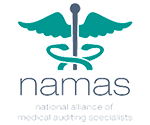Frank Cohen, Director of Analytics and Business Intelligence for DoctorsManagment
This auditing and compliance “Tip of the Week” was originally published by the National Alliance for Medical Auditing Specialists (NAMAS), a division of DoctorsManagement.
The first thing to note is that I am not an auditor. So, for me to write an article on auditing tips might seem a bit out of place. But this is not an article on auditing compliance but rather on being an auditor and while my tip, so to speak, is not geared toward the technical aspects of coding and auditing, it is directed toward the future career opportunities for auditors.
I have spent the last six years heavily involved in artificial intelligence (AI) research and development in the non-clinical areas of health care. This includes work in predictive analytics, machine learning and text recognition systems. And while I will never be worried about AI taking over the world, there are specific skills within specific industries that will be affected. For example, we have already seen how automated patient check-in and verification systems have reduced the numbers of front-office staff needed by practices. And we have seen how claims checkers have resulted in a reduction of back-office staff. What we are now seeing, due to progress in text recognition and natural language processing (NLP), is a decline in the need for coders at the basic coding level. Those who have pursued additional education and skills to become certified auditors made a wise decision. This is because while coding is comprised of algorithmic processes and is easily automated, auditing is an oversight function and will be very difficult to automate. Auditors review the work of human coders now and auditors will review the work of automated coding engines in the future. In either case, auditors are far less replaceable in this emerging world of healthcare technology than coders.
So, here you are: An auditor. What’s next? Well, it is my opinion that the need for auditors can be split into three distinct areas: analytics, litigation, and revenue cycle management. And with the need for experts comes the need for expert training. Let’s look at each of these areas one at a time.
Analytics
I believe we are all in agreement that compliance risk is increasing, which has caused an increase in the number and intensity of compliance audits. These audits can be external, such as a RAC, UPIC or OIG audit, or internal, such as regularly conducted coding and billing audits as well as repayment audits. In both cases, there needs to be someone with a reasonable understanding of basic statistics and analytics to manage these audits while advancing the organization’s interests. Sometimes, when organizations are faced with having to defend an external audit or initiate an internal audit, the organization might engage a statistician, like me, which is expensive and a bit time consuming. More commonly, I find that provider organizations try to work through it themselves, without the requisite training or experience, resulting in poor outcomes. An auditor equipped with statistical expertise and an analytics background would be ideally suited to fill this need because half the solution will always require an understanding of the underlying coding and billing concerns. Certified Auditor Analysts (maybe that’s what they will be called) would be in a perfect position to satisfy the basic needs for reviewing and contesting an external audit (at least for the first two levels of appeal) and designing internal reviews for compliance strategies and repayment issues.
Litigation
Along with an increase in the aggressiveness of outside audits, there is a need for auditing professionals with basic litigation support skills. There are three types of experts: witnesses, consulting experts and testifying experts. The difference between the first and the last is intent. Basically, if you are involved in an investigation, maybe just because you work for the organization, you may very well be called to testify. You may not want to; you may not feel qualified to; and you may not be ready to, but getting subpoenaed trumps all of those “nots.” The fact is, experts such as coders and auditors, get subpoenaed to testify all the time and being trained in the basics of testimonial skills and know-how can mean the different between winning and losing a case. Some of you may want to move into this area willingly. After all, it is a bit exciting and it can be quite profitable. Consulting experts are hired by attorneys to assist them with, for example, understanding the foundational aspects of coding and billing for a specific case or to assist them with preparing interrogatories for an upcoming deposition or trial. Or maybe they want you to render your opinion of another expert’s testimony. Testifying experts go one step further, providing their written opinion of their findings as well as testifying to such in both depositions and hearings.
Revenue Cycle Management (RCM)
We often think that RCM-type engagements are best left to the financial and operational folks but that is just not the case. I know of many organizations that are utilizing the skills of their auditors to assist with things like denial analysis. I conducted a study some 10 years ago and was shocked to learn that the overwhelming majority of providers simply write off denied claims rather than appealing them. The sad thing is that, when appealed, the findings are reversed in favor of the provider a majority of the time. The problem is that many organizations treat denials as technical problems when in fact they are more qualitative problems. I have watched qualified auditors – those with experience in analyzing and reviewing denied claims – reclaim huge amounts of money for their organizations. And when a pattern of wrongful denials has been identified, their value as analysts and sometimes as experts goes through the roof.
In summary, it is my opinion that there is a huge opportunity for auditors to become specialized in more than just different medical specialties. This opportunity will create the need for new and specialized training. Without stealing their thunder, I can tell you that NAMAS is in the process of developing training programs to certify auditors in each of these three areas. So fasten your seat belts and prepare to be trained!
This Week’s Audit Tip Written By:
Frank Cohen
Frank is the Director of Business Intelligence for The Frank Cohen Group and our parent company, DoctorsManagementWhat to do next…
- Contact us to discuss your audit needs by calling (800) 635-4040 or email [email protected].
- Read more: What can you expect from a coding and compliance review?
Here’s why thousands of providers trust DoctorsManagement to help improve their coding and documentation.
Quality of coders and auditors. Our US-based auditors receive ongoing training and support from our education division, NAMAS (National Alliance of Medical Auditing Specialists). All team members possess over 15 years of experience and hold both the Certified Professional Coder (CPC®) as well as the Certified Professional Medical Auditor (CPMA®) credential.
Synergy – DoctorsManagement is a full-service healthcare consultancy firm. The many departments within our firm work together to help clients rise above the complexities faced by today’s healthcare professionals. As a result, you receive quality solutions from a team of individuals who are current on every aspect of the business of medicine.

























